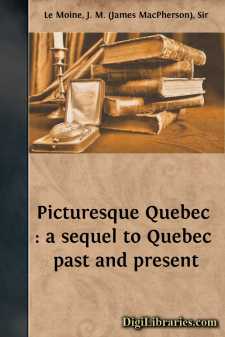Categories
- Antiques & Collectibles 13
- Architecture 36
- Art 48
- Bibles 22
- Biography & Autobiography 813
- Body, Mind & Spirit 142
- Business & Economics 28
- Children's Books 14
- Children's Fiction 11
- Computers 4
- Cooking 94
- Crafts & Hobbies 4
- Drama 346
- Education 46
- Family & Relationships 57
- Fiction 11828
- Games 19
- Gardening 17
- Health & Fitness 34
- History 1377
- House & Home 1
- Humor 147
- Juvenile Fiction 1873
- Juvenile Nonfiction 202
- Language Arts & Disciplines 88
- Law 16
- Literary Collections 686
- Literary Criticism 179
- Mathematics 13
- Medical 41
- Music 40
- Nature 179
- Non-Classifiable 1768
- Performing Arts 7
- Periodicals 1453
- Philosophy 64
- Photography 2
- Poetry 896
- Political Science 203
- Psychology 42
- Reference 154
- Religion 513
- Science 126
- Self-Help 84
- Social Science 81
- Sports & Recreation 34
- Study Aids 3
- Technology & Engineering 59
- Transportation 23
- Travel 463
- True Crime 29
Picturesque Quebec : a sequel to Quebec past and present
Description:
Excerpt
CHAPTER 1.
FIRST IMPRESSIONS OF QUEBEC.
Quebec, founded by Samuel de Champlain, in 1608, has certainly much to recommend her, by her monuments, her historical memories and her scenery, to the traveller—the scholar—the historian. The wintering of the venturesome Jacques Cartier on the banks of the St. Charles in 1535-6, by its remoteness, is an incident of interest, not only to Canadians, but also to every denizen of America. It takes one back to an era nearly coeval with the discovery of the continent by Columbus—much anterior to the foundation of Jamestown, in 1607—anterior to that of St Augustine, in Florida. Quebec, has, then, a right to call herself an old, a very old, city of the west.
The colonization of Canada, or, as it was formerly called, New France, was undertaken by French merchants engaged in the fur trade, close on whose steps followed a host of devoted missionaries who found, in the forests of this new and attractive country, ample scope for the exercise of their religious enthusiasm. It was at Quebec that these Christian heroes landed, from hence they started for the forest primeval, the bearers of the olive branch of Christianity, an unfailing token of civilization.
A fatal mistake committed at the outset by the French commanders, in taking sides in the Indian wars, more than once brought the incipient colony to the verge of ruin. During these periods, scores of devoted missionaries fell under the scalping knife or suffered incredible tortures amongst the merciless savages whom they had come to reclaim. Indian massacres became so frequent, so appalling, that on several occasions the French thought seriously of giving up the colony forever. The rivalry between France and England, added to the hardships and dangers of the few hardy colonists established at Quebec. Its environs, the shores of its noble river, more than once became the battle-field of European armies. These are periods of strife, happily gone by, we hope, forever.
In his "Pioneers of France in the New World," the gifted Francis Parkman mournfully reviews the vanished glories of old France in her former vast dominions in America:—
"The French dominion is a memory of the past; and when we evoke its departed shades, they rise upon us from their graves in strange romantic guise. Again their ghostly camp-fires seem to burn, and the fitful light is cast around on lord and vassal and black robed priest, mingled with wild forms of savage warriors, knit in close fellowship on the same stern errand. A boundless vision grows upon us: an untamed continent, vast wastes of forest verdure, mountains silent in primeval sleep; river, lake, and glimmering pool; wilderness oceans mingling with the sky. Such was the domain which France conquered for civilization. Plumed helmets gleamed in the shade of its forests; priestly vestments in its dens and fastnesses of ancient barbarism. Men steeped in antique learning, pale with the close breath of the cloister, here spent the noon and evening of their lives, ruled savage hordes with a mild, parental sway, and stood serene before the direst shapes of death....


